Ever wonder what causes constipation in Parkinson’s disease?
Researchers think that constipation could be the underlying disease process and therefore Parkinson’s disease itself could be the real cause of it. Constipation could also be the side effect of medications used to treat Parkinson’s symptoms. Moreover, following an unhealthy daily routine and certain eating habits may also contribute to its occurrence in patients.

Parkinson’s disease (PD) is a neurological condition that has affected over 10 million people worldwide. The disease is often characterized by motor symptoms like tremor, muscle stiffness, slowness of movement, and a problem with balance. However, there are some non-motor signs that also appear in PD. These signs are usually undermined by patients, and sometimes even by doctors.
Constipation is one of the key non-motor symptoms of PD. It appears in up to two-thirds of all PD patients. Researchers think that it precedes other symptoms and occurs before a proper diagnosis is made.
Frequent constipation not only causes physical discomfort but also leads to psychosocial distress and poses a negative impact on the quality of life of a patient. Therefore, it’s important to know what causes it.
Here are the four main causes of constipation in PD.
1. Parkinson’s Disease Itself
PD could itself cause constipation. Researchers think that constipation could be a part of the underlying disease process. Apart from affecting the body’s outer motor functions, PD also disrupts the body’s autonomic nervous system. This system comprises nerve cells that govern the involuntary processes inside the body, such as heart rate or blood pressure and digestion. In PD, the digestive tract movement becomes slower than normal which results in constipation.
2. Medication
Parkinson’s medications are often considered to be the main cause of constipation in patients. A number of drugs used to treat PD symptoms are linked to constipation. The most commonly used drugs that are known to cause constipation include L-dopa, dopamine agonists, COMT inhibitors, and amantadine. These drugs are thought to slow bowel movement, leading to constipation. In addition, the intake of other unprescribed medication, like painkillers or supplements, may also cause constipation in PD patients.
3. Eating Certain Foods
Eating certain food may also increase the risk of constipation. PD patients frequently eating red meat, processed grains, dairy products, and foods less in fiber may experience constipation more often than others.
Drinking not enough water and frequently drinking alcohol may also cause constipation in PD patients. Alcohol causes dehydration via enhancing fluid lost through urine, thus may increase the likelihood of constipation.
Related post: Diet for Parkinson’s patients – what to eat and when?
4. Lack of Exercise
Lack of physical activity may also pose PD patients to constipation. It’s now generally accepted that those patients who do regular exercise are less likely to develop constipation than those who don’t. Exercise relieves constipation by increasing interstitial activity and muscle tone.
How to Treat Constipation in PD?
Like other PD symptoms, constipation also needs proper attention. If left untreated, it could lead to other problems in a patient. These include constant abdominal pain, vomiting, diarrhea, weight loss, and bleeding.
The best way to deal with constipation is to talk to your doctor and explain your condition. Your doctor may find the cause and prescribe the treatment accordingly.
In addition, making changes in diet and lifestyle could help in coping with constipation. These changes include the following:
- Frequently eat food rich in fibers such as cereals, pulses, vegetables, and fruits including oranges, apples, and strawberries. These foods allow the stool to absorb more water to become bigger and softer. This makes it easy for the stool to pass through the intestines and be smoothly removed from the body.
- Frequently drinking water is best for combating constipation. Try to drink at least 8 glasses of water a day. Other forms of fluid like juice and soup could also be helpful.
- Avoid drinking liquids that cause dehydration like alcohol and coffee.
- Do not delay the urgent need to go to the toilet to empty the bowel.
- Do regular exercise. Doing exercise for at least 30 min will not only help in relieving constipation but also other symptoms of PD.
- Consider an abdominal massage once a day. It helps to normalize bowel motions and relieve constipation.
Disclaimer: The information shared here should not be taken as medical advice. The opinions presented here are not intended to treat any health conditions. For your specific medical problem, consult with your health care provider.
